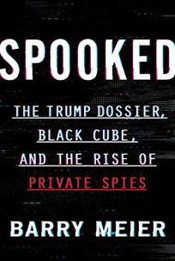Spooked: The Trump Dossier, Black Cube, and the Rise of Private Spies

This is two things: the story of for-profit spying in general, and the specific story of the “Steele Dossier” that was compiled on Donald Trump prior to the 2016 election.
As for the the general story, it’s a look at how investigative journalists often turn into spies-for-hire; essentially, global private investigators. They form shadowy companies that are available for corporate espionage or political opposition research (“oppo”).
These are firms like:
It’s that last one that the book concentrates on for the specific story of the Steele Dossier. That firm was started by Glenn Simpson, a former reporter for the Wall Street Journal. The book goes into Simpson’s backstory, and keeps revisiting him over and over throughout.
(Side note: it’s weird that Black Cube made it to the subtitle, since the book doesn’t spend much time on that company. Maybe it just had the sexiest, most marketable name?)
The problem is that the book can’t really decide what it wants to be: the general story, or the specific story. As a result, it doesn’t do great on either of them.
There are a lot of people involved (also not helpful: a lot of them have confusing Russian names). To provide context, the book goes into a lot of their histories, which brings up a lot of random stories, which made me think the book was about that person, but then it would swing out and go back to the Steele Dossier again.
That isn’t to say it’s boring. But you eventually just have to let all the names kind of wash over you, because it’s hard to keep track.
As for the Steele Dossier – turns out it was mostly crap. The verdict of the book is that Christopher Steele was really sloppy and relied on a terrible source. This means that “the pee tape” probably doesn’t exist, and there’s no evidence (in that dossier, anyway) that the Kremlin has any compromising material on Donald Trump.
Postscript
Added on
In Unleash the Power of Storytelling, I found this advice about “condensing” a story. It squares with my thoughts above.
Omit proper nouns: Just about anything in capital letters is ripe for trimming. Minor characters in your story don’t need to be named, especially if they make a one-time appearance. You can just call them “the bank manager” or “the CEO.”
The same goes for job titles, department names, and company names. A good rule of thumb is “name the known and omit the obscure.”
Book Info
- I have read this book. According to my records, I completed it on .
- A hardcover copy of this book is currently in my home library.